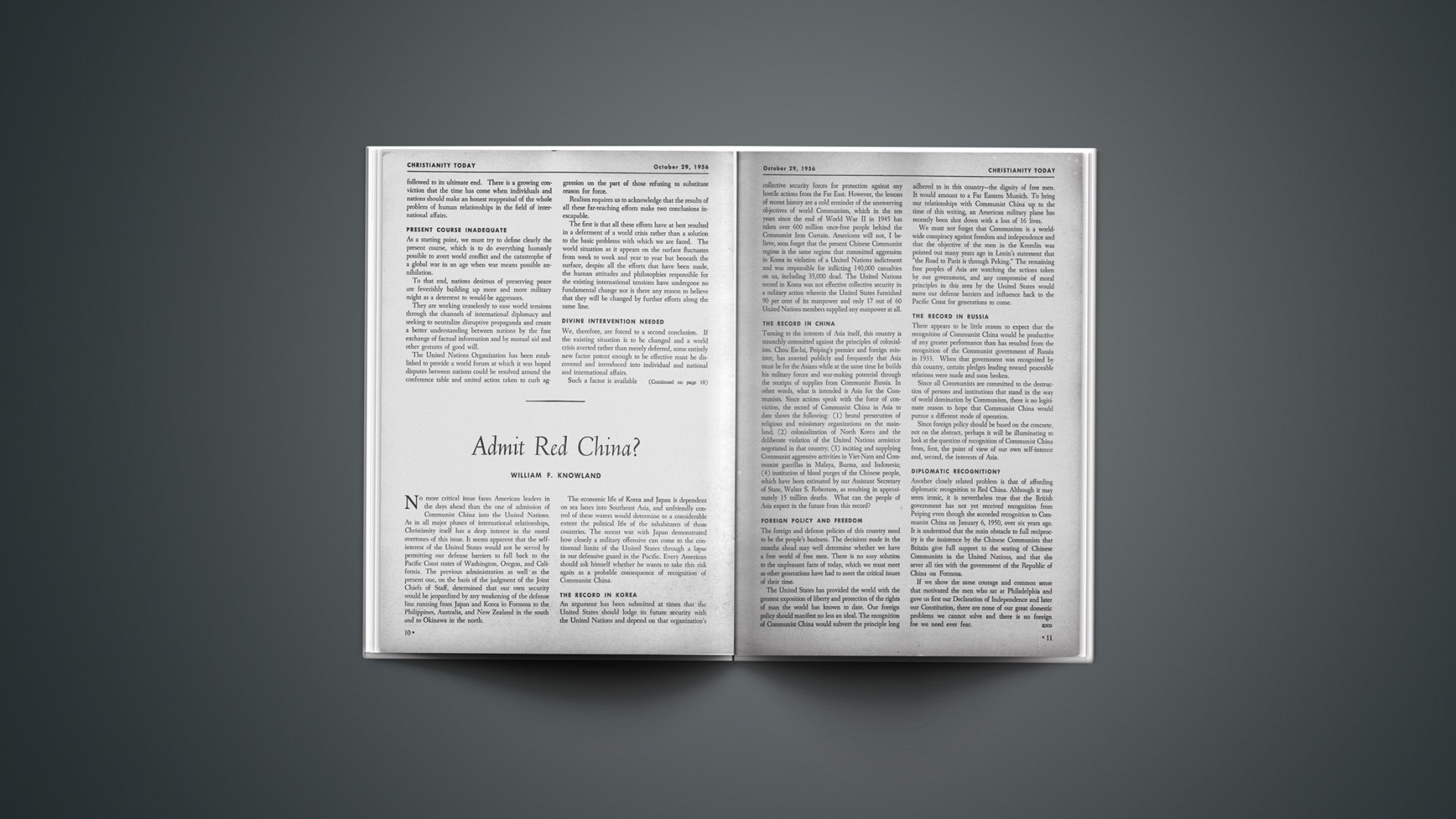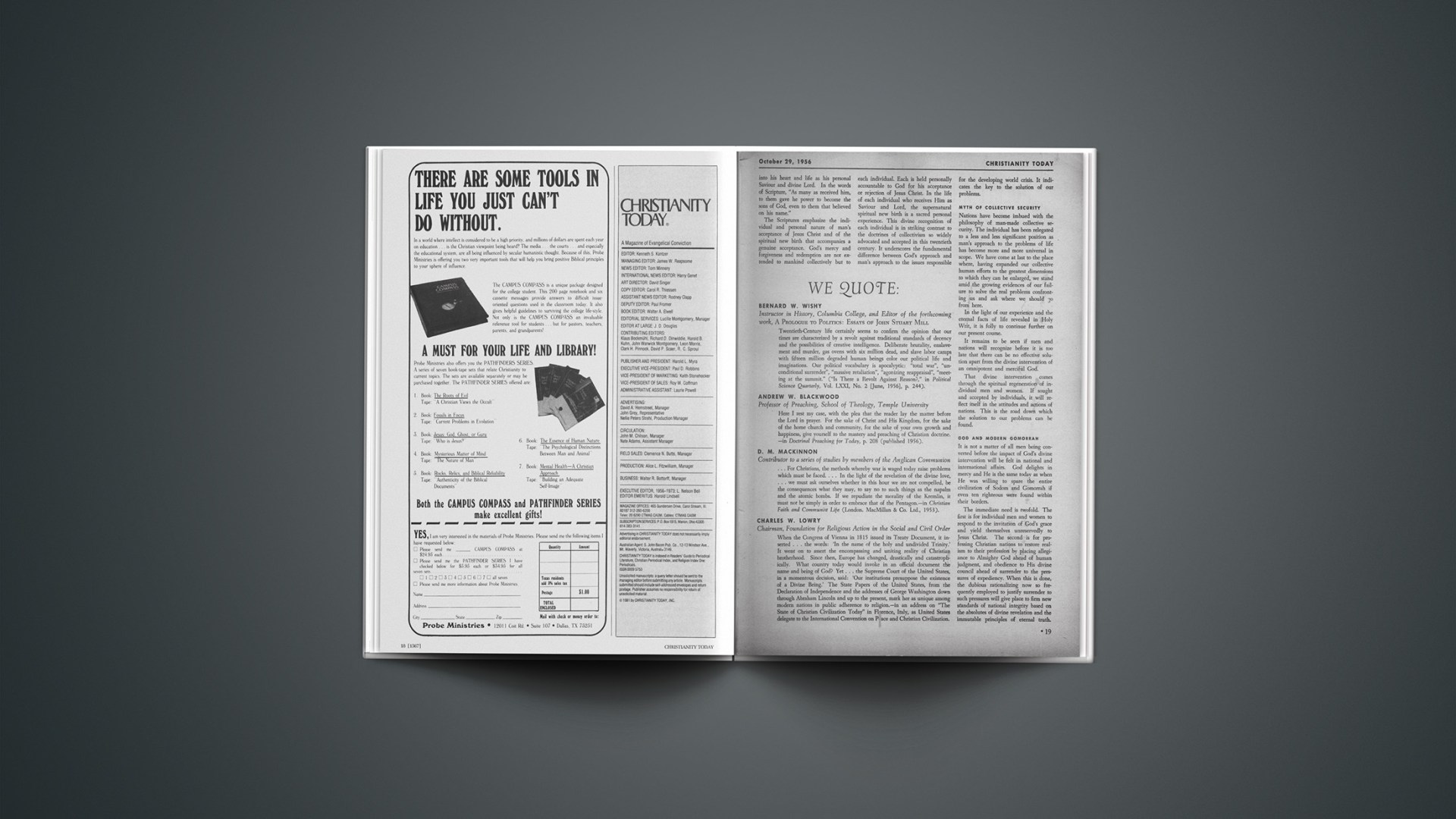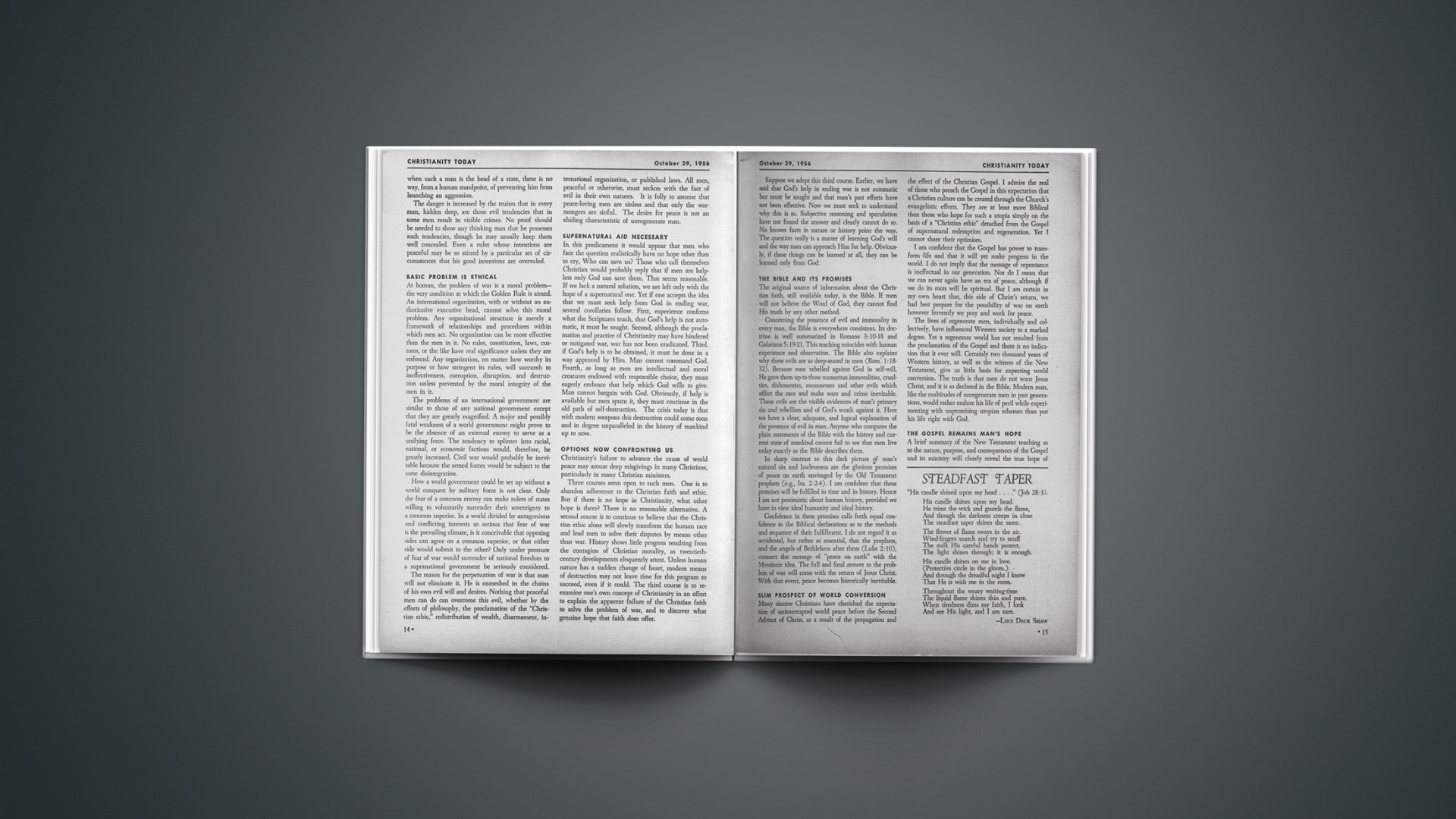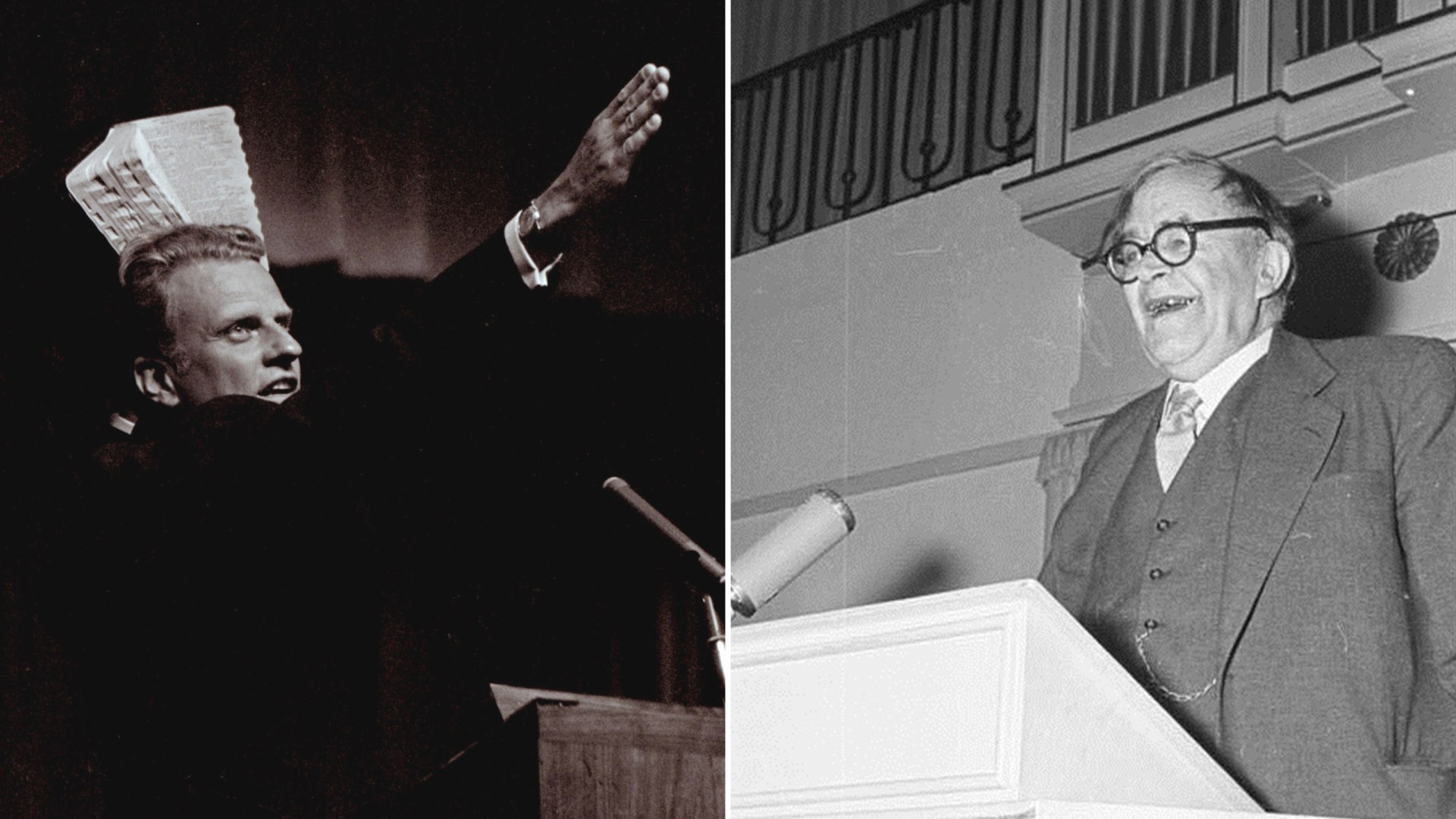No more critical issue faces American leaders in the days ahead than the one of admission of Communist China into the United Nations. As in all major phases of international relationships, Christianity itself has a deep interest in the moral overtones of this issue. It seems apparent that the self-interest of the United States would not be served by permitting our defense barriers to fall back to the Pacific Coast states of Washington, Oregon, and California. The previous administration as well as the present one, on the basis of the judgment of the Joint Chiefs of Staff, determined that our own security would be jeopardized by any weakening of the defense line running from Japan and Korea to Formosa to the Philippines, Australia, and New Zealand in the south and to Okinawa in the north.
The economic life of Korea and Japan is dependent on sea lanes into Southeast Asia, and unfriendly control of these waters would determine to a considerable extent the political life of the inhabitants of those countries. The recent war with Japan demonstrated how closely a military offensive can come to the continental limits of the United States through a lapse in our defensive guard in the Pacific. Every American should ask himself whether he wants to take this risk again as a probable consequence of recognition of Communist China.
The Record In Korea
An argument has been submitted at times that the United States should lodge its future security with the United Nations and depend on that organization’s collective security forces for protection against any hostile actions from the Far East. However, the lessons of recent history are a cold reminder of the unswerving objectives of world Communism, which in the ten years since the end of World War II in 1945 has taken over 600 million once-free people behind the Communist Iron Curtain. Americans will not, I believe, soon forget that the present Chinese Communist regime is the same regime that committed aggression in Korea in violation of a United Nations indictment and was responsible for inflicting 140,000 casualties on us, including 35,000 dead. The United Nations record in Korea was not effective collective security in a military action wherein the United States furnished 90 per cent of its manpower and only 17 out of 60 United Nations members supplied any manpower at all.
The Record In China
Turning to the interests of Asia itself, this country is staunchly committed against the principles of colonialism. Chou En-lai, Peiping’s premier and foreign minister, has asserted publicly and frequently that Asia must be for the Asians while at the same time he builds his military forces and war-making potential through the receipts of supplies from Communist Russia. In other words, what is intended is Asia for the Communists. Since actions speak with the force of conviction, the record of Communist China in Asia to date shows the following: (1) brutal persecution of religious and missionary organizations on the mainland; (2) colonialization of North Korea and the deliberate violation of the United Nations armistice negotiated in that country; (3) inciting and supplying Communist aggressive activities in Viet-Nam and Communist guerillas in Malaya, Burma, and Indonesia; (4) institution of blood purges of the Chinese people, which have been estimated by our Assistant Secretary of State, Walter S. Robertson, as resulting in approximately 15 million deaths. What can the people of Asia expect in the future from this record?
Foreign Policy And Freedom
The foreign and defense policies of this country need to be the people’s business. The decisions made in the months ahead may well determine whether we have a free world of free men. There is no easy solution to the unpleasant facts of today, which we must meet as other generations have had to meet the critical issues of their time.
The United States has provided the world with the greatest exposition of liberty and protection of the rights of man the world has known to date. Our foreign policy should manifest no less an ideal. The recognition of Communist China would subvert the principle long adhered to in this country—the dignity of free men. It would amount to a Far Eastern Munich. To bring our relationships with Communist China up to the time of this writing, an American military plane has recently been shot down with a loss of 16 lives.
We must not forget that Communism is a worldwide conspiracy against freedom and independence and that the objective of the men in the Kremlin was pointed out many years ago in Lenin’s statement that “the Road to Paris is through Peking.” The remaining free peoples of Asia are watching the actions taken by our government, and any compromise of moral principles in this area by the United States would move our defense barriers and influence back to the Pacific Coast for generations to come.
The Record In Russia
There appears to be little reason to expect that the recognition of Communist China would be productive of any greater performance than has resulted from the recognition of the Communist government of Russia in 1933. When that government was recognized by this country, certain pledges leading toward peaceable relations were made and soon broken.
Since all Communists are committed to the destruction of persons and institutions that stand in the way of world domination by Communism, there is no legitimate reason to hope that Communist China would pursue a different mode of operation.
Since foreign policy should be based on the concrete, not on the abstract, perhaps it will be illuminating to look at the question of recognition of Communist China from, first, the point of view of our own self-interest and, second, the interests of Asia.
Diplomatic Recognition?
Another closely related problem is that of affording diplomatic recognition to Red China. Although it may seem ironic, it is nevertheless true that the British government has not yet received recognition from Peiping even though she accorded recognition to Communist China on January 6, 1950, over six years ago. It is understood that the main obstacle to full reciprocity is the insistence by the Chinese Communists that Britain give full support to the seating of Chinese Communists in the United Nations, and that she sever all ties with the government of the Republic of China on Formosa.
If we show the same courage and common sense that motivated the men who sat at Philadelphia and gave us first our Declaration of Independence and later our Constitution, there are none of our great domestic problems we cannot solve and there is no foreign foe we need ever fear.
The Hon. William F. Knowland is minority leader of the United States Senate and was United Nations delegate to the United Nations session in November.












